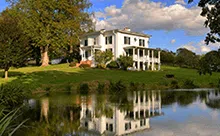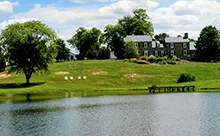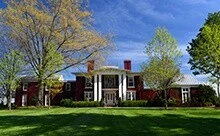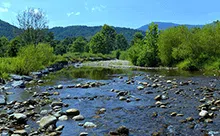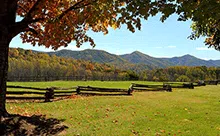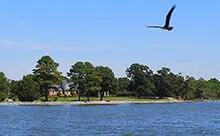
home / virginia resources / charlottesville / Charlottesville, Birthplace of Presidents
Charlottesville, Birthplace of Presidents
More About Charlottesville
Thomas Jefferson
America’s third president and one of the most influential Founding Fathers, Thomas Jefferson was born in nearby Shadwell, Virginia, and made his home at Charlottesville’s Monticello. Known for his strong support of republicanism in the early years of America, Jefferson was a man of the Enlightenment, who sought to provide an alternative to British h imperialism.
Long politically active, Jefferson was a driving force in the American fight against Britain: Jefferson served as the Virginia delegate to the second Continental Congress, which adopted the Declaration of Independence, and later the Articles of Confederation (predecessor to the Constitution). Jefferson was the primary author of the Declaration of Independence, the formal explanation for the American desire to break from Britain.
Towards the end of the Revolutionary War, Jefferson succeeded Patrick Henry as the governor of Virginia. After the Treaty of Paris, Thomas Jefferson served as a delegate from Virginia to the Congress of the Confederation, also known as the Continental Congress. While the Constitution was in the making, Jefferson was overseas serving as the United States Ambassador to France during the crucial period just prior to the outbreak of the French Revolution. Upon ratification of the Constitution, Thomas Jefferson served as the Secretary of State under George Washington, and Vice President under John Adams.
Thomas Jefferson is recognized for the Louisiana Purchase, which doubled the size of the United States, and for his promotion of the Lewis and Clark expedition, which was significant in advancing geographic knowledge of the continent. Jefferson wanted to be remembered not only for his contributions to the Declaration of Independence, but also to the work he did on the Virginia Statute for Religious Freedom and the creation of his “Academical Village” the University of Virginia.
It was perhaps said best by John F. Kennedy when welcoming Nobel Prize winners: “This is the most extraordinary collection of talent and of human knowledge that has ever been gathered together at the White House – with the possible exception of when Thomas Jefferson dined alone.”
James Madison
Political philosopher and Founding Father, the “Father of the Constitution” James Madison made his home at Charlottesville’s neighboring Montpelier. Collaborating with Alexander Hamilton, Madison wrote over a third of the Federalist Papers, a comprehensive and widespread commentary on the Constitution which advocated its ratification.
Today, these articles still serve as a primary source of interpretation of the Constitution in its original form. James Madison is noted for his support of checks and balances to protect individual rights, and the rights of the minority. After the Constitution was ratified, Madison wrote the first ten amendments, granting him the nickname “Father of the Bill of Rights”.
Madison was a leader in the first United States Congress, and helped to establish precedents which are still subscribed to today. He was notably the first president to have served in Congress. James Madison, together with Thomas Jefferson, formed the Republican Party (which later became the Democratic – Republican Party). He also collaborated with Jefferson on the Virginia and Kentucky Resolutions in opposition to the Alien and Sedition Acts, which formed the basis of the principle of nullification and interposition.
Today, James Madison’s Montpelier is available to be toured.
James Monroe
James Monroe made his home at Ash Lawn in Charlottesville, Virginia. As the fifth president of the United States, Monroe was the last of the Founding Fathers to also serve as president. Before his presidential election, Monroe served as Virginia Senator, Ambassador to France, Ambassador to Britain, governor of Virginia, and Secretary of State and Secretary of War under James Madison.
Monroe’s presidency was marked by an “Era of Good Feelings” during which he downplayed partisanship (the Federalist Party had virtually dissolved already), the Missouri Compromise temporarily resolved the growing slavery crisis, and Florida was acquired from Spain. Today, James Monroe is most recognized for his promulgation of the Monroe Doctrine, which was widely embraced as foreign policy after his presidency.
The Doctrine stated that the United States would no longer tolerate European interference in the Western Hemisphere, and that any further colonization by European powers would be met by aggression. This proclamation broadcasted the idea that the Americas and Europe had inherently separate governments, and was invoked by Roosevelt, Coolidge, Hoover, Kennedy, and Reagan.




















